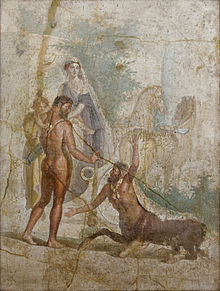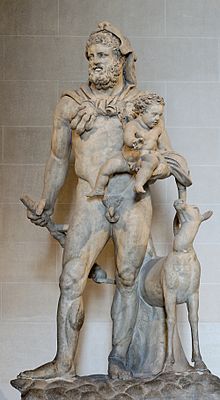
Back Heraklın övladları AZ Геракліды BE Хераклиди Bulgarian Heraclides Catalan Heraklider Danish Herakleiden German Ηρακλείδες Greek Heraklidoj EO Heraclidas Spanish Heraklidak EU


The Heracleidae (/hɛrəˈklaɪdiː/; Ancient Greek: Ἡρακλεῖδαι) or Heraclids /ˈhɛrəklɪdz/ were the numerous descendants of Heracles, especially applied in a narrower sense to the descendants of Hyllus, the eldest of his four sons by Deianira (Hyllus was also sometimes thought of as Heracles' son by Melite). Other Heracleidae included Macaria, Lamos, Manto, Bianor, Tlepolemus, and Telephus. These Heraclids were a group of Dorian kings who conquered the Peloponnesian kingdoms of Mycenae, Sparta and Argos; according to the literary tradition in Greek mythology, they claimed a right to rule through their ancestor. Since Karl Otfried Müller's Die Dorier (1830, English translation 1839), I. ch. 3, their rise to dominance has been associated with a "Dorian invasion". Though details of genealogy differ from one ancient author to another, the cultural significance of the mythic theme, that the descendants of Heracles, exiled after his death, returned some generations later to reclaim land that their ancestors had held in Mycenaean Greece, was to assert the primal legitimacy of a traditional ruling clan that traced its origin, thus its legitimacy, to Heracles.
In the historical period, several dynasties claimed descent from Heracles, such as the Agiads and Eurypontids of Sparta, or the Temenids of Macedonia.